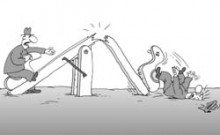In most regions of Ukraine bread prices rose 30-40% in November alone. Other foodstuffs followed suit, albeit to a lesser degree, and even vegetables sold at unusually higher prices for the season. Ukrainian bakers say there is still no remedy for the bread rush. In some regions where the local authorities took their time complying with the cabinet’s decision to cancel price ceilings and setting a 5% bread and flour production level, prices may jump again before the end of the year, with another 10% increase before the next harvest comes in.
According to the State Statistics Committee, Ukraine’s inflation rate was 1.9% in November and 6.6% since the start of the year. Compared to October, foodstuffs sold 2.8% higher in November (8.5% against December 2002). Nonfoods showed 0.2% and 1.3%, respectively. Services were 4.9% more expensive compared to the previous year. The National Bank’s Board at one time predicted 6-7% inflation rate for 2003. Now they admit that the rate may reach 8.5%. The Economy Ministry, however, insists that the forecast is overstated and that the rate will stay at 7.2%.
In a word, the food sector shows inflationary trends. If the November high rate remains the same in December, says NBU head Serhiy Tihipko, the National Bank of Ukraine will be prepared to raise the discount rate (precisely a year ago, it was said the rate would decline). “If the prices increase beyond 7% in December, we will respond, because the NBU rate cannot be negative,” he declared Tuesday, explaining the decision to keep the annual discount rate at 7% in November by the National Bank being reluctant to signal the commercial banks to raise their loan rates: “We don’t want to boost the rates.”
The Finance Ministry, being a player in the currency and financial game to be reckoned with, does not seem to accept these forecasts. It believes that the overall 2003 inflation rate will not be higher than 7.6%, this being no tragedy. First Vice Premier Mykola Azarov is convinced that “we will end the year with 7.6% annual inflation at most. Actually, I expect it to be less.” He predicts that the rate will not be as high in December as in the previous two months. “I thing that we passed the peak in October and November. That peak was caused by mounting grain prices,” he explains, adding that this kind of inflation does not damage the economy, because, as he put it, this year’s GDP growth will be quite significant, 7.5%, meaning that it will compensate for inflation. This approach even allowed the government to undertake to pay all social benefits and wages due the spending units before the New Year.
This controversy among the powers that be is not easy to figure out not only for the man in the street, anxious to keep his pension or pay above water, but also for a businessman keeping track of inflation and exchange rate, so as to know which way his company should go. Business may well decide to be on the safe side and add inflation risks to production costs. Is it worth it?
Valery Lytvytsky, advisor to the NBU head, told The Day, “Naturally, the inflation rate in November left us worried somewhat, but there is no reason to dramatize the situation. Come what may, inflation will remain at the predicted level. Considering industrial output figures in November, economic growth will be even higher in December and positive deviations from the predicted GDP increment will be greater than all those negative deviations from the inflation forecasts. Besides, there are a number of opportunities to keep this year’s inflation rate under 8%. The second inflation peak in November could have been smaller if we had been more active with grain imports. The main inference, however, is that one has to pay more for a better economic conjuncture. Inflation, likewise, can be referred to that conjuncture, in other words, as consequences of economic growth that we have overcome.”
Lytvytsky believes that the inflation of people’s anxiety that can easily turn into a panic is the most dangerous factor today, which could actually make prices soar. But if the populace and the market take the November inflation outburst in their stride, the NBU chief adviser is certain that this inflation will overflow the riverbanks.







